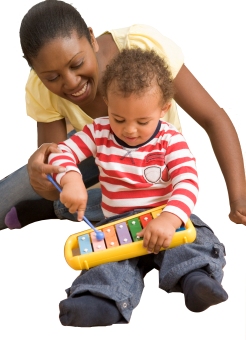Important Milestones: By the End of One Year (12 Months)
Babies develop at their own pace, so it’s impossible to tell exactly when your child will learn a given skill. The developmental milestones listed below will give you a general idea of the changes you can expect, but don’t be alarmed if your own baby’s development takes a slightly different course.
Social and Emotional
- Shy or anxious with strangers
- Cries when mother or father leaves
- Enjoys imitating people in his play
- Shows specific preferences for certain people and toys
- Tests parental responses to his actions during feedings
- Tests parental responses to his behavior
- May be fearful in some situations
- Prefers mother and/or regular caregiver over all others
- Repeats sounds or gestures for attention
- Finger-feeds himself
- Extends arm or leg to help when being dressed
Cognitive
- Explores objects in many different ways (shaking, banging, throwing, dropping)
- Finds hidden objects easily
- Looks at correct picture when the image is named
- Imitates gestures
- Begins to use objects correctly (drinking from cup, brushing hair, dialing phone, listening to receiver)

Language
- Pays increasing attention to speech
- Responds to simple verbal requests
- Responds to “no”
- Uses simple gestures, such as shaking head for “no”
- Babbles with inflection (changes in tone)
- Says “dada” and “mama”
- Uses exclamations, such as “Oh-oh!”
- Tries to imitate words
Movement
- Reaches sitting position without assistance
- Crawls forward on belly
- Assumes hands-and-knees position
- Creeps on hands and knees
- Gets from sitting to crawling or prone (lying on stomach) position
- Pulls self up to stand
- Walks holding on to furniture
- Stands momentarily without support
- May walk two or three steps without support
Hand and Finger Skills
- Uses pincer grasp
- Bangs two objects together
- Puts objects into container
- Takes objects out of container
- Lets objects go voluntarily
- Pokes with index finger
- Tries to imitate scribbling
Developmental Health Watch
- Does not crawl
- Drags one side of body while crawling (for over one month)
- Cannot stand when supported
- Does not search for objects that are hidden while he or she watches
- Says no single words ("mama" or "dada")
- Does not learn to use gestures, such as waving or shaking head
- Does not point to objects or pictures
- Experiences a dramatic loss of skills he or she once had.
If You’re Concerned – Act Early
If you are concerned that your child is not reaching developmental milestones at the same time as other children the same age, visit our web page to find out what you can do to help.
From CARING FOR YOUR BABY AND YOUNG CHILD: BIRTH TO AGE 5 by Steven Shelov, Robert E. Hannermann, © 1991, 1993, 1998, 2004 by the American Academy of Pediatrics. Used by permission of Bantam Books, a division of Random House, Inc.
Contact Us:
- Centers for Disease Control and Prevention
- National Center on Birth Defects and Developmental Disabilities
- Division of Birth Defects and Developmental Disabilities
- 1600 Clifton Road
- MS E-86
- Atlanta, GA 30333
- 800-CDC-INFO
(800-232-4636)
TTY: (888) 232-6348
24 Hours/Every Day - cdcinfo@cdc.gov


